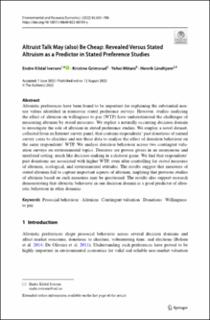| dc.contributor.author | Iversen, Endre Kildal | |
| dc.contributor.author | Grimsrud, Kristine | |
| dc.contributor.author | Mitani, Yohei | |
| dc.contributor.author | Lindhjem, Henrik | |
| dc.date.accessioned | 2023-03-01T18:30:16Z | |
| dc.date.available | 2023-03-01T18:30:16Z | |
| dc.date.created | 2022-08-01T20:24:09Z | |
| dc.date.issued | 2022 | |
| dc.identifier.citation | Environmental and Resource Economics. 2022, 83 681-708. | |
| dc.identifier.issn | 0924-6460 | |
| dc.identifier.uri | https://hdl.handle.net/11250/3055143 | |
| dc.description.abstract | Altruistic preferences have been found to be important for explaining the substantial nonuse values identifed in numerous stated preference surveys. However, studies analysing the efect of altruism on willingness to pay (WTP) have underestimated the challenges of measuring altruism by stated measures. We exploit a naturally occurring decision domain to investigate the role of altruism in stated preference studies. We employ a novel dataset, collected from an Internet survey panel, that contains respondents’ past donations of earned survey coins to charities and use these data to analyse the efect of donation behaviour on the same respondents’ WTP. We analyse donation behaviour across two contingent valuation surveys on environmental topics. Donators are proven givers in an anonymous and unrelated setting, much like decision-making in a dictator game. We fnd that respondents’ past donations are associated with higher WTP, even after controlling for stated measures of altruism, ecological, and environmental attitudes. The results suggest that measures of stated altruism fail to capture important aspects of altruism, implying that previous studies of altruism based on such measures may be questioned. The results also support research demonstrating that altruistic behaviour in one decision domain is a good predictor of altruistic behaviour in other domains. Prosocial behaviour · Altruism · Contingent valuation · Donations · Willingness to pay | |
| dc.language.iso | eng | |
| dc.title | Altruist talk may (also) be cheap: Revealed versus stated altruism as a predictor in stated preference studies | |
| dc.title.alternative | Altruist talk may (also) be cheap: Revealed versus stated altruism as a predictor in stated preference studies | |
| dc.type | Peer reviewed | |
| dc.type | Journal article | |
| dc.description.version | publishedVersion | |
| dc.source.pagenumber | 681-708 | |
| dc.source.volume | 83 | |
| dc.source.journal | Environmental and Resource Economics | |
| dc.identifier.doi | 10.1007/s10640-022-00704-y | |
| dc.identifier.cristin | 2040505 | |
| dc.relation.project | Norges forskningsråd: 235560 | |
| dc.relation.project | Norges forskningsråd: 280393 | |
| cristin.ispublished | true | |
| cristin.fulltext | original | |
| cristin.qualitycode | 2 | |
